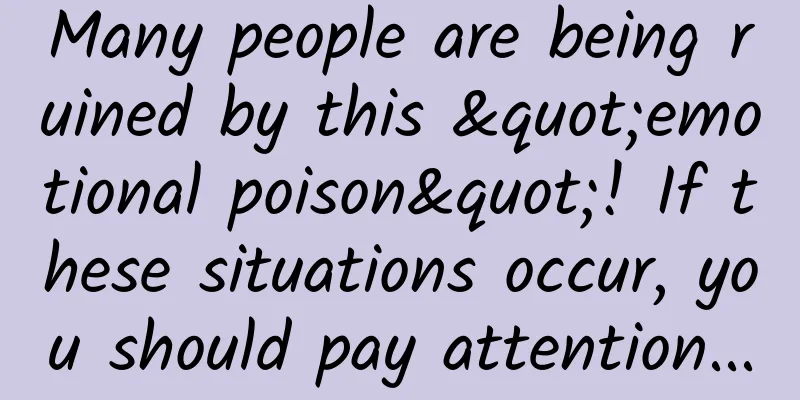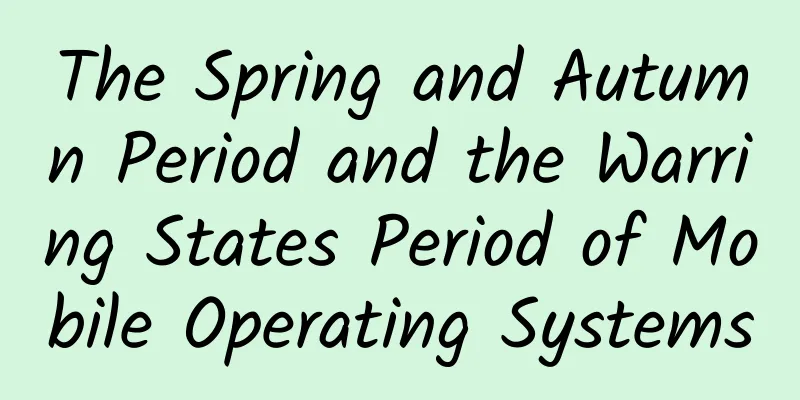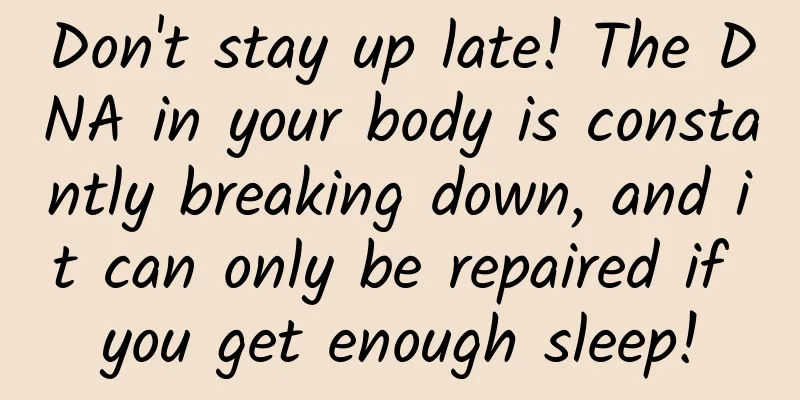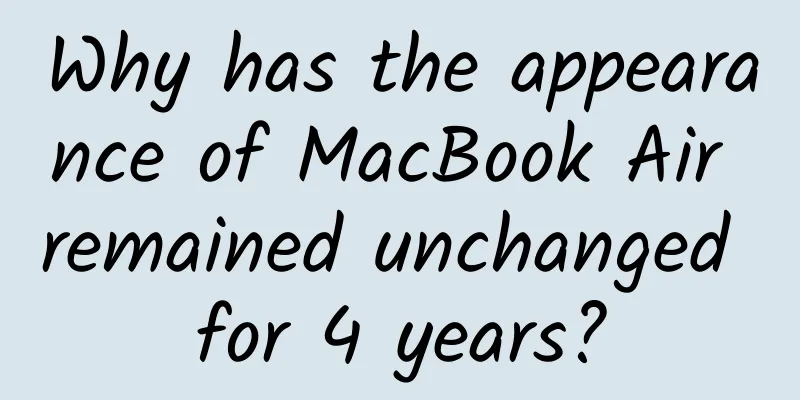Many people are being ruined by this "emotional poison"! If these situations occur, you should pay attention...

|
In life, many people have heard or said something like this: "If you really love me/care about me, you should..." "I have done so much for you, and yet you..." "If you had done it earlier... this wouldn't have happened." "Look at you, you make me so disappointed/sad/upset..." "I'm doing this for your own good, why don't you understand?" "Why can't you understand my efforts? Haven't I done enough?" "If you hadn't done this to me, I wouldn't be like this now." Some people will then fret or blame themselves: "If I had cared more about him/her, he/she wouldn't be so angry. It's all my fault." "If I hadn't said that at the time, we wouldn't have had a fight. It's all my fault." "I should have spoken up, but I kept silent. I am such a coward." "I should have worked harder and done more for him. It's really unkind of me to be like this now." "I wish I could spend more time with him. Now that he's gone, I feel regretful." "Why didn't I see the problem sooner? I was so stupid." In fact, whether it is accusation or reflection, behind these words there is often an undercurrent of emotion of "you owe me" or "I owe you". This "owe" is like an invisible chain that binds us tightly in the abyss of guilt. Copyright images in the gallery. Reprinting and using them may lead to copyright disputes. The following situations: Signs that you may be "overly guilty" Guilt is a moral emotion that arises from a deep reflection on one's own behavior, usually when we believe we have hurt others or violated our personal moral standards. It is an experience full of self-blame and negative emotions, often accompanied by deep inner conflict and uneasiness. Image source: Internet Although guilt carries a strong negative connotation, it also has certain positive effects. Guilt can prompt us to reflect deeply on our own behavior and recognize our own mistakes and shortcomings, thus inspiring our determination and actions to take responsibility, make up for our mistakes, and improve ourselves. Studies have shown that people who are prone to feeling guilty are more empathetic, more reliable, and more likely to gain the trust of others. However, the positive effects of guilt can usually only be exerted under moderate and reasonable circumstances. However, many times the situations in which we feel guilty are not so clear, and we often experience misplaced guilt, taking on emotional burdens beyond our responsibility and influence, leading to anxiety, helplessness, and even self-doubt. 1 Feeling guilty about other people's mood swings Especially when they express dissatisfaction, frustration or anger, it often triggers our guilt. Although other people's emotions may not be directly caused by our behavior, many people instinctively believe that they are responsible for these emotions and feel excessive guilt. This emotion usually comes from an underlying belief that "I should make the people around me happy" or "It's my fault that others are unhappy." For example, if a friend suddenly becomes silent or cold, even if there is no obvious conflict, you will still wonder if you have done something wrong. Copyright images in the gallery. Reprinting and using them may lead to copyright disputes. 2 Feeling guilty about saying no to someone's request It is part of our personal rights to refuse other people's requests, especially when there are reasonable reasons or when the request itself is beyond our ability. However, some people often feel uneasy and guilty about their refusal because they are overly concerned about the feelings of others or are afraid of affecting the relationship. This guilt often stems not from actual mistakes, but from misunderstanding responsibilities and setting too high a standard for yourself. For example, if a colleague asks you to help cover a shift, but you refuse due to personal commitments, you will suffer from the worry that the other party will be dissatisfied with you because of this. 3 Guilt over the plight of others Contrary to the mentality of "seeing you unhappy makes me happy", feeling guilty about others' misfortunes stems from over-empathy with others' emotions. We believe that we are closely connected to other people's emotions and situations, and even mistakenly believe that our happiness or success may make others unhappy or frustrated. Therefore, even if the plight of others has nothing to do with oneself, one may feel unnecessary guilt and think that one should bear some responsibility or feel guilty. For example, if one is in a smooth relationship and one's friend is experiencing emotional setbacks, one may feel that one's happiness makes the friend's pain more obvious, thus feeling unnecessary guilt. 4 Guilt for not meeting the needs of others Failing to meet the needs of others is an inevitable part of life, but excessive guilt often leads people into a spiral of self-blame, viewing reasonable limitations as major personal failures. This emotion is not only unhelpful in solving practical problems, but may also bring greater psychological pressure to oneself and others. For example, if a child wants to participate in an activity or course, but cannot support it due to time, money or other factors, the parent may feel that he or she is an "incompetent parent" who has not been able to provide the best for the child. 5 Repeatedly apologize and compensate for past mistakes In some cases, even if the incident has long passed and the other party has expressed understanding, we will still blame ourselves too much and keep apologizing for past mistakes and try to make amends. Typical manifestations are: ① Excessive apologies. For example, because you forgot an important appointment, even if the other party clearly said that they didn't mind, you would still mention it many times and apologize again afterwards, and even feel that you need to do something to make up for it every time you meet; ② Extra compensation. For example, if you were unable to attend an important event with a friend due to busy work, you would not only apologize afterwards, but also give gifts or treat them to meals, trying to alleviate your guilt through actions; ③ Unable to let go. Even if you have made up for your mistakes through actions, you still blame yourself repeatedly, worrying whether you have not done enough or whether the other party's forgiveness is just "face work". 6 Feeling guilty about taking personal time In our busy lives, it is necessary to take time out to enjoy personal time, but we often blame ourselves while enjoying it, thinking that we are "too indulgent" or "not motivated." This emotion makes people feel that they are wasting time and should use this free time to read books, study, or do more "meaningful" things to improve themselves. For example, if you stay in bed for a while longer on the weekend, your body will relax, but your mind will be thinking about the work or tasks that you could have done if you got up earlier. Copyright images in the gallery. Reprinting and using them may lead to copyright disputes. How to get out of the quagmire of "excessive guilt"? If rational guilt is an emotion that helps us recognize our mistakes and improve our behavior, then excessive guilt often comes from setting high and unrealistic expectations for ourselves. These expectations may be imposed on us by society or others, or they may be set unconsciously by ourselves. When these expectations are far beyond our actual abilities or realistic conditions, we tend to feel powerless and guilty when we fail to achieve these goals. The key to getting out of the dilemma of "excessive guilt" is to adjust and reshape these expectations. 1 Replace "should" with "can" If you feel guilty easily, it may be because you have too many "shoulds" in your mind. "Shoulds" are often a sign of guilt, usually caused by unrealistic expectations. People who often feel guilty often use "I should..." or "I should have..." in their conversations, reflecting that they set too high standards for their own behavior. When these standards are not met, guilt follows. For example, a working mother may think: "I should be able to take good care of the family and perform well at work." However, in reality, balancing family and work is often very difficult. When she finds that she cannot meet the needs of both at the same time, she may fall into guilt and feel that she is neither a good mother nor a good employee. Therefore, try to replace "I should" with "I can" or "I can" . "Should" often carries a rigid standard and high expectations. It is like an invisible ruler that constantly measures our behavior and results. When there is a gap between reality and "should", guilt and self-blame will follow. "Can" represents a flexible choice and positive possibility. It recognizes our limitations and the variability of life, and encourages us to do our best within our capabilities. Copyright images in the gallery. Reprinting and using them may lead to copyright disputes. When we express ourselves with “I can” or “I do”, it not only helps us get rid of guilt and self-blame, but also encourages us to focus more on our own abilities and potential rather than being bound by fixed standards. 2 Set a “range” for “expectations” We often experience misplaced guilt, taking on emotional burdens beyond our responsibility and sphere of influence, and a big reason for this is that we set expectations that have no clear boundaries or definitions. When we set expectations such as "spend more time with children", "care more about parents", or "invest more in work", we often face a question: how much is "more"? What level is "enough"? "More" is a subjective feeling and a relative concept. We may understand it as extremely frequent or large-scale investment, which may even lead us into endless efforts. Without clear standards, we often cannot judge whether we have achieved these expectations, so we constantly question ourselves and fall into the guilt of "I haven't done enough". In real life, we can't fulfill every responsibility perfectly, nor do all expectations need to be met without limit. Therefore, you can try to set a clear "range" for your "expectations". For example, adjust "I need to spend more time with my children" to "spend at least 1 hour of outdoor activities with my children every week" or "have a 15-minute parent-child conversation with my children every night." By setting specific numbers or time frames, we can more clearly measure whether we have met our expectations, thereby avoiding endless self-blame and guilt. Finally, I hope everyone can realize that guilt should be a healthy reflection on one's own behavior, rather than endlessly taking on responsibilities that do not belong to us. When we blindly blame ourselves, not only will we not be able to improve the relationship, but we may also fall into a state of powerlessness and anxiety, affecting our mental health. References [1] Valorie Burton. (2023). Getting rid of mental exhaustion: Why we are always dominated by guilt, self-blame and guilt. China Renmin University Press. ISBN: 9787300314532 [2] Ilse Sander. (2022). Guilt Clearing Exercise: For Those of You Who Often Blame Yourself. Taiwan Strait Publishing House. ISBN: 9787516833407 [3]Levine, E., Bitterly, TB, Cohen, TR, & Schweitzer, ME. (0). Who is trustworthy? predicting trustworthy intentions and behavior. Social Science Electronic Publishing.Guilt | Psychology Today Planning and production Author: Su Jing, National Level 2 Psychological Counselor Review丨Fu Sufen, Vice President and Secretary General of Zhejiang Mental Health Association Planning丨Yinuo Editor: Yinuo Proofread by Xu Lai and Lin Lin |
<<: When animals hibernate, how low can their body temperature drop? The answer is unexpected
Recommend
Kuaishou advertising for second-tier e-commerce companies in the apparel industry
1. Current status of short video development Shor...
Douyin is a small business with zero threshold to make money with a daily income of 600+. All you need is hands!
Did you know? Emojis can not only be used for pic...
The two Microsofts: From being caught between a rock and a hard place to having the best of both worlds?
[[122625]] Editor's note: This article is mai...
How can programmers achieve "fast programming speed and few bugs"?
[[131966]] A netizen asked on Quora: How can I tr...
What is Wenchang Tower? How to choose Wenchang Tower?
Wenchang Tower is one of the common Feng Shui orn...
AppStore has a loophole and user privacy has been leaked on a large scale
A vulnerability appeared in the AppStore, causing...
15 years after the Wenchuan earthquake: They are more "insidious" than earthquakes, and this difficult problem has not been solved
We often lament the instantaneous power and destr...
Hao Jingfang: 100 general education lessons to improve children's reading ability
This product is the first series of children'...
How to make valuable competitive product analysis?
1. Why do we need to do competitive product analy...
6 information flow industry cases and delivery data, form costs exposed!
Today, Qingguajun will share with you the analysi...
Android 5.1 is not available
Android 5.0 is the latest version released by Goo...
The nuclear power plant’s new sideline business – producing pearls!
Nuclear power plants are places where nuclear ene...
Design of easily scalable game skill system from multiple perspectives
[[145670]] A well-expanded skill system can well ...
Indonesia is so rich that it can do whatever it wants? It purchases foreign weapons on a large scale and continues to develop a sci-fi "three-body stealth speedboat"
Indonesia has approved a $125 billion budget to m...
Traveling during the Spring Festival, be stylish but don’t ignore the food
Nowadays, the way people celebrate the Spring Fes...









